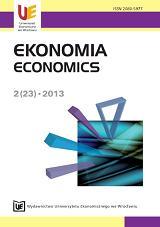Koncepcja copyleft w procesie wytwarzania dóbr partnerskich
Copyleft conceptin the process of manufacturing peer goods
Author(s): Marcin Brol, Sławomir CzetwertyńskiSubject(s): Economy
Published by: Wydawnictwo Uniwersytetu Ekonomicznego we Wrocławiu
Keywords: peer production; copyleft; public sphere
Summary/Abstract: This article discusses the copyleft concept in the context of peer production in the context of the changes that have taken place in the public sphere. As indicated by some studies (eg RD Putnam’s work), the traditional public sphere is in atrophy, and the dialogue between public actors has been transferred to the digital platform. This allows public actors to become independent of place and time, and the relative anonymity and allows them to change the role and scope of participation in public life. The dialogue takes place in the framework of the “new” public sphere and is reflected in the peer production process, which is based on a common pool of digital assets. Proper conduction of this process is dependent on institutional innovation, which is the copyleft concept. It is defined as a legal structure that gives the licensee or end user unrestricted right to use, modify and reproduce the work – in this case, a peer good, produced in the peer production process. In practice, this concept is a reversal of the basic purpose of copyright, the objective of reducing the possibility of using, modifying or copying of intellectual property. At the same time it uses copyright licenses through the appropriate wording for partner products. It is therefore a form of adaptation of existing institutional governance tools to new needs that have developed in parallel to the formation of the public sphere on the digital platform. The relationships between the “new” public sphere, producing peer production and the role played by the concept of copyleft implies the main objective of this study. It is the presentation of the idea of copyleft, and an indication of its practical application in the peer production process. An additional objective is to demonstrate the impact of the peer production process on a digital public sphere, particularly the exchange of digital information goods. The article discusses the peer production process and also the assumptions and the conditions in which it can take place. It also presents the causes of atrophy of the traditional public sphere and the need to adapt the tools of copyright protection in order to ensure public dialogue. The research studies are based largely on the example of the operating system GNU/Linux and knowledge repository – Wikipedia.org, through which the main assumptions of peer production are presented. The paper also points the practical importance of copyleft in this process and the effects it produces in the development of the relations between the actors of the public sphere. The authors have also analyzed the economic benefits of entities using the peer goods and applying copyleft licenses.
Journal: Ekonomia
- Issue Year: 2013
- Issue No: 23
- Page Range: 137-150
- Page Count: 14
- Language: Polish

